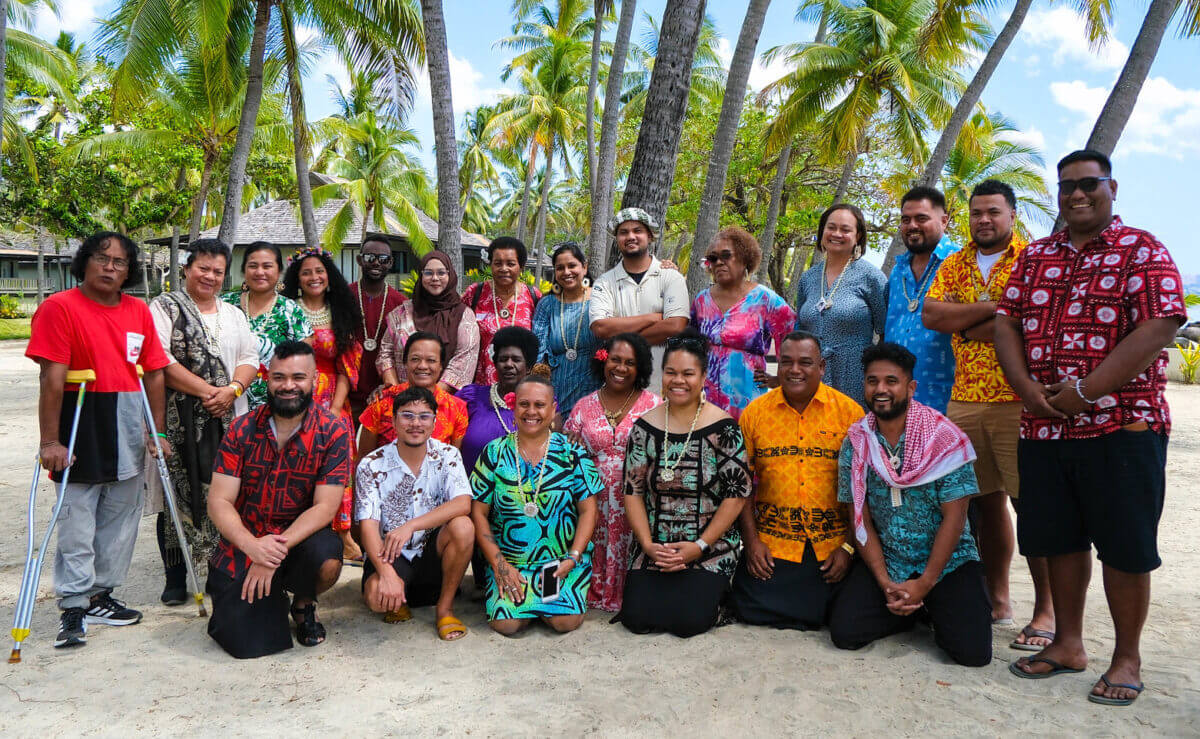Pacific Rising collective gathered in Fiji to spearhead Non-Economic Loss and Damage (NELD) priorities
Pacific partner organizations gathered to share experiences and strategies toward a localized, inclusive, and community-led initiatives for addressing climate impacts.

We need increased national and regional conversations on non-economic loss and damage and strategies to address the intersectional burdens on local Pacific communities.
Nadi, Fiji – Nine community-based partners from across the Pacific participated at the third Pacific Rising Gathering in Sonaisali, Nadi from 15-19 September to share their work in addressing the intersections of Non-Economic Loss and Damage (NELD), gender, and intersectionality. This work, which is supported by the Unitarian Universalist Service Committee and the Climate Justice Resilience Fund was funded by the Scottish government who was the first country to commit to funding Loss and Damage at COP 26 in Glasgow in 2021. Organizations include Tulele Peisa Inc, Banaban Human Rights Defenders, Te Toa Matoa, Climate Talk, Kioa Island Community Organisation, Tuvalu Climate Action Network, Jo-Jikum, Kiribati Climate Action Network, and the Ecological Solutions Foundations.
The agenda focused on using culturally appropriate decolonial processes that integrate inclusive storytelling to share learnings of NELD impacts and strategies, gender and intersectionality, experiences and challenges around grant distribution, and determining next steps to leverage regional and global visibility and advocacy.
The gathering began with a memorial service for James Bakati, a great disability activist from Te Toa Matoa in Kiribati, a partner organization that advances the rights of persons living with disabilities in Kiribati’s laws and policies. The memorial offered a collective space to honor, celebrate, and speak James Bakati’s name with power and affirmation that all our work is paving the pathway towards an inclusive, resilient, and united future for all Pacific people, no matter our background, ability, and geography.
The Pacific NELD partners participation reflects a strong and united regional commitment to amplify community-led and community based strategies that address non-economic loss and damage, strengthen inclusion and the active engagement of diverse communities in decision-making and identify strategic spaces of partnership and advocacy engagement to influence policy.
The partnership and gathering is supported by UUSC and the Climate Justice Resilience Fund.
“Addressing non-economic loss and damage in the Pacific requires the engagement of impacted communities, particularly women, girls, youths, elders, and persons with disabilities. It also requires a decolonial approach to funding NELD where the experiences and impact of the work that these organizations and communities are doing inform global funding responses.”
—Salote Soqo, Director of Advocacy, UUSC
The Pacific Rising collective hosts a yearly gathering. The expansion of their space, attendees and holistic agenda is an outcome of a collective praxis of reflection and aims to expand its parameters with care to affirm their commitment on inclusion and meaningful engagement of diverse and grassroot communities.
—–
Media enquiries should be directed to:
Itinterunga Rae Bainteiti
pycmfocalpoint@gmail.com
+679 7283 293
BACKGROUND INFORMATION
Pacific Partners on Non-Economic Loss and Damage (NELD)
The partnership between Pacific community-based organizations and UUSC was created and developed in 2016 to advance the self-determination of Indigenous Peoples in addressing the risks of climate-forced displacement in the Pacific. UUSC provides multi-year, general operating support to organize communities, build awareness, relocate communities forcibly displaced by the climate crisis, build adaptation based on local and traditional ecological knowledge systems, and support advocacy of Pacific island communities in national, regional, and global spaces for human rights protection and more direct and flexible resources to support communities in their decisions to adapt, relocate, and migrate.
In 2018, UUSC along with the Climate Justice Resilience Fund (CJRF) convened the first of its kind First Peoples Convening on Climate-Forced Displacement in Girdwood, Alaska where Pacific partners along with leaders from Alaska Native communities and Louisiana Tribal Nations shared stories, experiences and strategies to advance their self-determination as they experience first hand the impacts of climate-forced displacement. This resulted in the First Peoples Declaration on CFD.
In 2021, the Scottish government as host of COP26 in Glasgow, Scotland was the first country to commit to funding loss and damage. The Scottish government acted on their commitment and provided funding to CJRF, who partnered with UUSC in 2023 to address Loss and Damage in the Pacific. In 2024, the Scottish government provided additional funding to CJRF to specifically address NELD and advance gender/intersectionality. Through the pre-existing relationship and partnership with CJRF, UUSC as a recipient of this funding is supporting existing partners in the Pacific to address NELD and gender/intersectionality.
The Pacific NELD project is a 3-year initiative that started in 2024 and ends in 2026. As a group, the Pacific partnership, now called Pacific Rising, is leveraging the Scottish-CJRF funds to advance the intersectionality of NELD and gender/intersectionality in the Pacific and to model the impact of bilateral and multilateral funds on advancing rights and community-based strategies when directly impacted communities are able to access funds directly. Our shared goal to decolonize funding, advance climate justice and human rights drives our collective work.
Stay informed!
Sign up to receive regular updates on UUSC’s human rights work, advocacy campaigns, and ways you can make a difference in people’s lives here in the United States and around the globe.